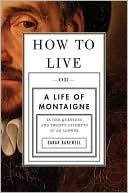More on this book
Community
Kindle Notes & Highlights
Read between
May 7 - May 13, 2021
Montaigne was anxious to forestall any expectation that he might be a copy of his own father, ruining his health with work. He remembered seeing Pierre worn out by business trips, “his soul cruelly agitated by this public turmoil, forgetting the sweet air of his home.”
The epidemic lasted until December, and during those few months more than 14,000 people died in the city, almost a third of its population. More people were killed than in the St. Bartholomew’s massacres across the whole country, yet, as often happens with epidemics occurring in time of war, it left little trace on historical memory. In any case, plague was common.
This was at odds with the doctrines of Christianity, which insisted that you must constantly repent of your past misdeeds, in order to keep wiping clean the slate and giving yourself fresh beginnings. Montaigne knew that some of the things he had done in the past no longer made sense to him, but he was content to presume that he must have been a different person at the time, and leave it at that.
Just as he would not think of passing judgment on a roomful of acquaintances, all of whom had their own reasons and points of view to explain what they had done, so he would not think of judging previous versions of Montaigne.
Old age provides an opportunity to recognize one’s fallibility in a way youth usually finds difficult. Seeing one’s decline written on body and mind, one accepts that one is limited and human. By understanding that age does not make one wise, one attains a kind of wisdom after all.
The twenty-first century has everything to gain from a Montaignean sense of life, and, in its most troubled moments so far, it has been sorely in need of a Montaignean politics. It could use his sense of moderation, his love of sociability and courtesy, his suspension of judgment, and his subtle understanding of the psychological mechanisms involved in confrontation and conflict. It needs his conviction that no vision of heaven, no imagined Apocalypse, and no perfectionist fantasy can ever outweigh the tiniest of selves in the real world.
Perhaps some of the credit for Montaigne’s last answer should therefore go to his cat—a specific sixteenth-century individual, who had a rather pleasant life on a country estate with a doting master and not too much competition for his attention. She was the one who, by wanting to play with Montaigne at an inconvenient moment, reminded him what it was to be alive. They looked at each other, and, just for a moment, he leaped across the gap in order to see himself through her eyes. Out of that moment—and countless others like it—came his whole philosophy.


